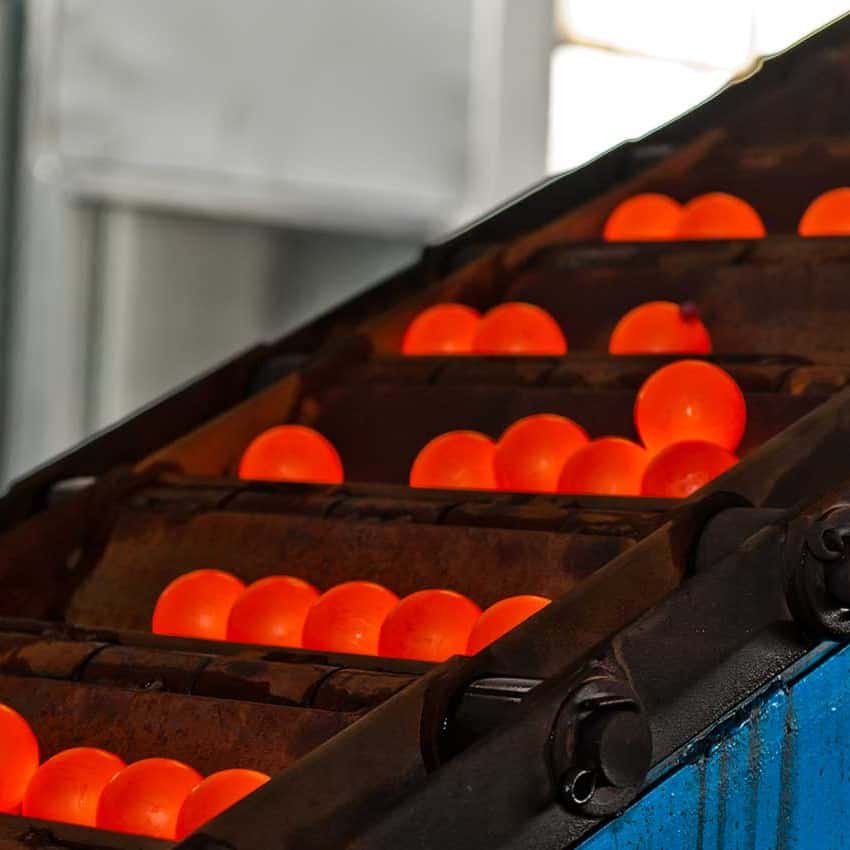Wet grinding mills work suitably with forged balls, dry grinding mills work suitably with casting balls and each kind of balls has its advantages in different working conditions.
1. Casting steel ball:
(1) Roughness surface: pouring mouth parts easily occurs in the use process flat and deformation and out-of-round, influence grinding effect;
(2) Internal loose: because of casting, the ball internal organization large, and during the process, the broken rate is high and the impact toughness is small; the ball greater, the mill is greater, and it has a greater chance of broken;
(3) Not suitable for wet grinding: the casting ball resistance depends on the wear resistance of chromium. The New material grinding balls chromium content higher the wear resistance is higher. But the characteristics of chromium are easy to corrosion, chromium is prone to corrosion, especially in the ore sulfur. Due to the wet grinding conditions, using chromium ball will cause cost increase and yield decrease.
2. Characteristics of forged and hot rolling steel ball:
(1) Smooth surface: using the forging process, no defects on the surface, no deformation, no out of round, and keeps the good grinding effect.
(2) Internal close: because of the round steel forging, it avoids the defect of as-cast condition for process, internal density, fine granularity, and enhanced the ball drop resistance and impact toughness, thereby reducing the ball breaking rate.
(3) Can be both dry and wet grinding. Due to new high anti-wear materials of high-quality alloy steel and our independent research and development, a reasonable ratio and addition of rare elements of the alloy elements, controlling the content of chromium, so the corrosion resistance is greatly improved. In view of the mine for wet grinding conditions, the steel ball is more suitable for the working condition.
3. If using the semi-autogenous grinding ball with a diameter of 100-150mm steel ball, it can not only reduce the consumption but also increase the processing capacity. But due to the defects of the casting process, the casting ball breaking rate is far higher than that of Grinding Ball.
4. Simply, the casting ball are the “hot” resistant ball (suitable for dry grinding), forged ball are the “corrosion” resistant ball (suitable for wet grinding), casting ball for 1.5-3.8m ball mill and forged ball for 1.5-11m ball mill.
Customers need to choose the steel ball according to different conditions, generally speaking, the cement factory for casting balls, and forging balls are suitable for mines, power plants, and other industries.
Youtube about skew rolling mill: https://www.youtube.com/user/skewrollingmachine
The Analysis of Work Conditions for Forged Balls(by hammer or by skew rolling mill) and Casting Balls(by smelting)
Share on facebook
Share on twitter
Share on linkedin

- Peter
- April 22, 2015
- 10:50 am
- No Comments
内容目录
Peter
Hi, I’m Peter, the founder of skewrollingmills.com, I’ve been running a company in China that producing grinding steel balls skew rolling mill equipment for 8 years now, and the purpose of this article is to share with you the knowledge related to grinding steel ball process from a Chinese supplier’s perspective.
